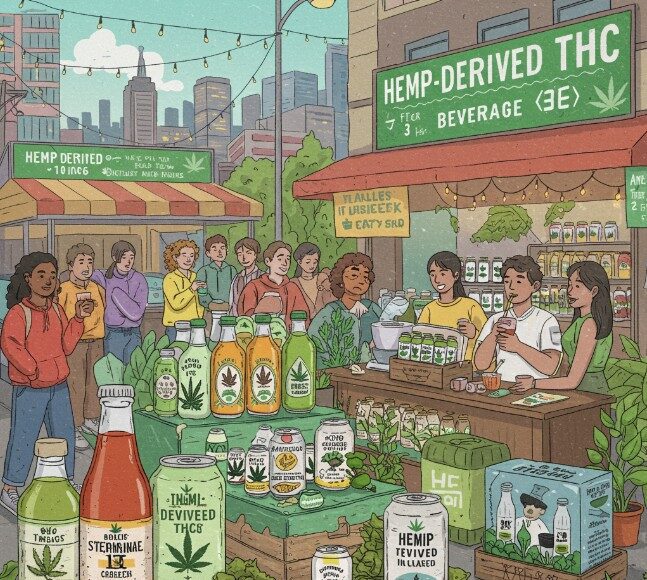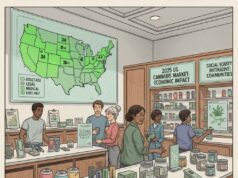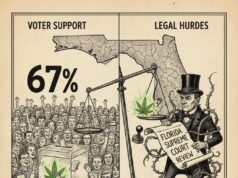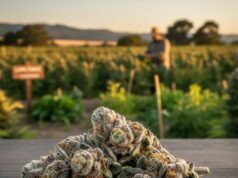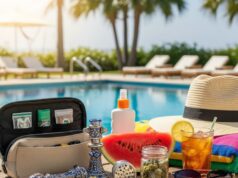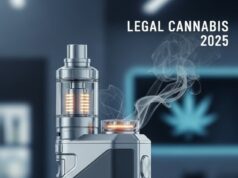As regulations surrounding cannabis evolve, the market for federally legal, hemp-derived THC beverages is attracting significant attention from established companies.
This week saw Organigram Global, a major Canadian marijuana producer, announce a multimillion-dollar acquisition of Collective Project, a Canadian manufacturer specializing in delta-9 THC drinks. This move follows Curaleaf founder Boris Jordan’s recent unveiling of a hemp THC-infused energy drink combining 10mg of THC with 50mg of caffeine.
This burgeoning hemp-beverage sector, fueled by changing consumer preferences and current legal frameworks, is also drawing interest from mainstream retailers and large corporations. Recent entrants include tech giant DoorDash and Edible Arrangements’ parent company, Edible Brands, a franchise giant with approximately $500 million in annual revenue from its fruit basket delivery service.
The rise of intoxicating hemp beverages, which began in Minnesota in 2023, has spread nationwide, particularly gaining traction in the Southeast, Texas, and states without established regulated marijuana markets. Notably, Minnesota regulates hemp-derived cannabinoid products even as it prepares for recreational marijuana sales.
Licensed marijuana operators and traditional retailers are employing diverse strategies to capture consumers in this evolving landscape, while navigating challenges related to production, warehousing, and delivery as more states implement restrictions or outright bans on these products.
Mainstream Companies Embrace Hemp-Derived THC
Edible Brands launched its e-commerce platform, Edibles.com, in Texas on March 20th. This marketplace, which plans to expand to the Carolinas, Florida, and Georgia, currently offers a range of hemp-derived THC products, including delta-9 beverages, gummies, and drink enhancers, from brands like 1906, Ayrloom, Cann, Cantrip, Happi, and Wana Brands.
Thomas Winstanley, hired by Edible Brands to spearhead this initiative, cited internal research indicating that consumers primarily use THC and CBD for sleep, pain management, and relaxation. He emphasized the company’s goal to “increase accessibility to health and wellness.” Winstanley also expressed concern over the variable quality of hemp-derived THC products found in unregulated outlets like gas stations.
Edibles.com employs a robust age verification process for both online purchases and deliveries, which are handled by Edible Arrangements franchisees acting as third-party logistics hubs. The company also intends to open a flagship retail store in Atlanta this summer, serving as a prototype for a franchise model aimed at democratizing access to this market at a lower cost compared to traditional cannabis retail.
Tilray’s Delta-9 Beverage Strategy
Tilray Brands, a Canadian cannabis and alcohol company, entered the delta-9 THC beverage market in late 2024 with its Happy Flower brand, featuring fruit daiquiris and Bellinis. Sam Garfinkel, Tilray’s SVP of commercial operations and strategy, highlighted the Southeast as a key focus due to its “permissive language” and rapidly growing category.
Market analysis firm Euromonitor International projects significant growth in hemp-derived THC beverage sales, forecasting a surge to $4.1 billion by 2028, a 1,615% increase from $239 million in 2023.
Tilray leverages its team of food scientists and its alcohol distribution network for the development and delivery of its beverage products. The company’s strategic acquisition of numerous craft breweries between 2020 and 2023, including SweetWater Brewing Co., Alpine Beer Co., Green Flash Brewing Co., and Montauk Brewery Co., underscores its commitment to the beverage market.
Tilray CEO Irwin Simon previously noted that the company’s expansion into the American alcohol market was a strategic move to adapt to delays in federal marijuana reform, a factor also driving its entry into the hemp-derived THC space. Tilray’s alcohol beverage sales saw a 36% year-over-year increase, accounting for roughly 30% of its quarterly revenue. Despite this strong performance, Tilray acknowledges the generational decline in alcohol consumption, particularly among Gen Z.
Organigram echoed this sentiment regarding its acquisition of Collective Project, stating that brands offering enjoyable experiences without the negative effects of alcohol are well-positioned to succeed in the rapidly expanding alternative beverage category.
Retailers Increasingly Onboard
Brez, a Florida-based beverage brand, has experienced remarkable growth, projecting a $50 million run rate this year. The company, primarily focused on direct-to-consumer online sales, also generates about 25% of its revenue through 3,000 brick-and-mortar locations nationwide, including major chains like Total Wine & More and Binny’s Beverage Depot.
Total Wine has also established retail agreements with Curaleaf to carry its hemp-derived THC seltzers and with Wana Brands for its infused beverages in over 100 outlets across nine markets. Brez CEO Aaron Nosbisch noted the increasing participation of major retailers in this sector, attributing consumer demand partly to a generational shift away from alcohol and the desire for “feeling good without feeling worse.”
Navigating Evolving Regulations
Wana Brands launched its online marketplace, Wanderous, in August 2024, featuring its own line of delta-9 sparkling beverages. The company employs a hybrid distribution model, combining direct-to-consumer sales with retail partnerships. Stephanie Daley, Wana’s VP of supply chain and operations, highlighted the rapid consumer adoption and enthusiasm for their beverage line.
Wana dedicates significant resources to monitoring the dynamic legislative and regulatory landscape in the approximately dozen states where it sells hemp-derived THC products. Recent developments, such as a bill advancing in the Texas Senate that would ban hemp-derived THC products, illustrate the ongoing regulatory uncertainty facing the industry. Texas is considered a central market for these products, and such bans pose a significant threat to the sector’s growth. Daley acknowledged the constant regulatory hurdles the company faces.


